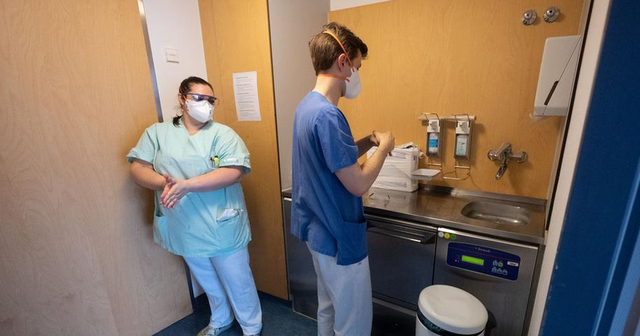
 Flash News
Flash News
The US is involved in the war, why did Trump take the risk of attacking Iran?
Bosnian tourist drowns in Durres
Massive accident on the Librazhd-Qukas axis, 3 injured, one in critical condition
An apartment in Yzberisht is engulfed in flames
Robbed a jeweler in Gjirokastra in 2021, 45-year-old extradited from Greece (NAME)
Lack of doctors and financial crisis in hospitals, DW: How will Germany's sick health system recover?

Lack of doctors, financial crisis in hospitals, poor digitalization standards. Germany's Health Minister Lauterbach aims for a wide-ranging reform of the health system, but faces criticism. When the German Minister of Health, Karl Lauterbach talks about the reform, words like revolution are heard, according to him, the new reform is nothing less than a revolution. At an annual conference of doctors in early May, Germany's health minister called the reform plans he had been working on for two years a "Zeitenwende" - a turning point - in German health care - an allusion to the military turn he made learned Chancellor Olaf Scholz after the Russian aggression against Ukraine in February 2022.
Fear of increased health insurance contributions
About 15 different bills are at a "critical stage," Lauterbach told doctors, all part of a larger effort to tackle a range of problems facing Germany's health system — including: Too few doctors, too many beds empty hospital beds, high financial pressure on hospitals and poor digitization standards.
But opinions on these plans are divided: doctors' associations have praised Lauterbach's plans, while health insurers have warned that it could lead to even higher contributions. Dirk Heinrich, specialist doctor and chairman of the Virchowbund doctors' association, told DW that the reforms are "light and dark". Eugen Brysch, chairman of the German Patient Protection Organization, Deutsche Stiftung Patientenschutz, criticized Lauterbach. "The Federal Minister of Health has many ideas. But it is doubtful whether they are practical," he told DW.
New payment method for hospitals
However, one of Lauterbach's biggest and most controversial plans was approved by Olaf Scholz's government cabinet a few days ago - a hospital reform that will change the way German hospitals are financed and set new healthcare standards.
Germany has the highest number of hospital beds per capita in the European Union (7.9 beds per 1,000 inhabitants - the EU average is 5.3), but maintaining them is expensive. According to Lauterbach, this brought many hospitals to the brink of bankruptcy. The result is that many patients stay in the hospital unnecessarily, so that hospitals can extract additional money from health insurers - which in turn increases the entire country's health costs and insurance contributions.
The new reform envisages that hospitals will no longer be paid for treatment – instead, they will have a guaranteed income for providing certain services. The hope is that this will ease the financial pressure on hospitals that perform as many operations and treatments as possible, even if they are not qualified to perform them.
The reform is supposed to ensure that patients who need complex treatments are referred earlier to specialists. This, according to the Ministry of Health, will reduce health costs in the long run, as patients have a better chance of being cured and are less likely to fall victim to errors. Lauterbach expects this reform to save tens of thousands of lives a year.
A large number of hospitals
"Hospital reform is right and important," Heinrich told DW. "We have many hospitals, but what is happening now is very little. Reforming hospitals without a comprehensive reform of ambulatory treatment and without reforming the emergency system will not bring any change."
Even Eugen Brysch is skeptical. "In the field of ambulatory medical care, the elderly, the chronically ill and the dependent on health care will find it almost impossible to find a new doctor," Brysch points out.
Another problem: Germany struggles with a shortage of doctors in rural areas, as not many doctors want to live in these areas. The Ministry of Health wants to solve this problem by offering clinics in rural areas additional money. But Eugen Brysch thinks, that "the fact that better earning opportunities are now being created will not automatically lead to more doctors in rural areas. After all, other factors also play a role."
At least one issue was resolved with the recent reforms: the payment cap for GPs. Doctors have long complained about this budget cap - and have occasionally gone on strike over it, because it often forces them to treat patients for free. This change, Lauterbach hopes, will give doctors more incentives to take on more patients. Dirk Heinrich from the doctors' association welcomed the reform, but points out that it does not go far enough. "It stops halfway, because the budgets remain in place for specialist doctors", he says. "It doesn't bring anything to a patient if he gets an appointment with the family doctor sooner, but then has to wait months for a specialist."
Some smaller reforms are less controversial: Eg. German Health Minister Karl Lauterbach wants every patient to have a single digital medical record that shows the treatments and test results from all the doctors who treated him. There are also plans to reduce waiting times at clinics by allowing doctors to carry out consultations online or over the phone and provide a year's worth of medication to people with chronic conditions. Until now, such patients had to see their doctor every three months to renew their prescriptions.
Also, the hospital atlas is now available online. It enables patients to compare hospitals using an overview of treatment options, numbers of cases treated and number of complications, as well as information on the qualifications of hospital staff./DW
Latest news


Posta e mëngjesit/ Me 2 rreshta: Çfarë pati rëndësi dje në Shqipëri
2025-06-23 07:22:30
Krim brenda familjes në Greqi, 61-vjeçari vret prindërit e tij të moshuar
2025-06-22 21:57:48
US airstrikes/ Iran warns: The game is not over!
2025-06-22 21:29:22


The US is involved in the war, why did Trump take the risk of attacking Iran?
2025-06-22 20:28:22
Israel-Iran conflict increases global tensions: Is the Albanian economy at risk?
2025-06-22 20:02:04
The US bombed Iran/ Rama: I support Trump's sincere efforts!
2025-06-22 19:40:21
Bosnian tourist drowns in Durres
2025-06-22 19:05:48

The 10 strongest criticisms of the PACE report on the May 11 elections!
2025-06-22 18:41:21



An apartment in Yzberisht is engulfed in flames
2025-06-22 17:32:13


Rinderpest/ The number of outbreaks rises to 10, here are the affected districts
2025-06-22 16:25:12


"Trump has opened Pandora's box"
2025-06-22 15:10:04

Pope Leo XIV: Stop the tragedy of war before it becomes an irreparable abyss
2025-06-22 14:24:22
Criminal group busted in Belgium, 10 Albanians among those arrested
2025-06-22 14:00:58
Cities race for tourists, Tirana cheapest, but busiest
2025-06-22 13:35:53
Kurti supports US strike: International security needs fewer nuclear weapons
2025-06-22 13:18:54
Selling drugs in the former Bllok, 23-year-old arrested
2025-06-22 12:57:58
Berisha supports US strike on Iran: Strong call for overthrow of dictatorship
2025-06-22 12:39:35
Starmer supports US attack on Iran, calls on Tehran to return to negotiations
2025-06-22 12:20:56
Sentenced to 8 years in prison in Italy, 33-year-old Albanian arrested
2025-06-22 11:54:45
Iran condemns US attack on nuclear facilities, warns of consequences
2025-06-22 11:34:21


Albanian Railways is affected by collective staff cuts
2025-06-22 10:46:46
The US has changed the course of the conflict - how will Iran respond?
2025-06-22 10:24:26
Cannabis in drainage canals, 48-year-old arrested in Fier
2025-06-22 10:06:41
Albanians 'invade' New York, thousands march in the Red and Black parade
2025-06-22 09:44:26
Foreign exchange, the rate at which foreign currencies are sold and bought
2025-06-22 09:27:27
Is it worth buying an apartment to rent out?
2025-06-22 09:12:40
US bombs Iran, hits three Tehran nuclear sites
2025-06-22 08:53:08
Horoscope, what do the stars have in store for you today?
2025-06-22 08:35:50
Weather forecast/ How temperatures will change during the day
2025-06-22 08:20:43
Morning Post/ In 2 lines: What mattered yesterday in Albania
2025-06-22 08:00:29

Iranian President: We will not stop nuclear program
2025-06-21 21:46:32
Europe hit by first heat wave: Up to 40°C expected this weekend
2025-06-21 21:19:19
Borussia Dortmund claim first win in Club World Cup
2025-06-21 20:56:04

Accident on the Puka-Shkodra axis, two injured
2025-06-21 20:05:04

ChatGPT can damage your brain, here's what the study says
2025-06-21 19:20:25


Belarus opposition leader released after five years in prison
2025-06-21 18:22:57
Renowned journalist and teacher in Korça, Vehbi Furxhi, passes away
2025-06-21 18:06:16
Accident in Fier-Levan, two injured
2025-06-21 17:43:25
Tourism in traffic, when roads undo success
2025-06-21 17:25:31

Broja on the verge of leaving Chelsea, 4 teams in talks for midfielder
2025-06-21 16:42:02
Iran confirms death of tenth nuclear scientist
2025-06-21 16:24:28

The Balkans as a warehouse for migrants?
2025-06-21 15:49:53

Khamenei names potential successors if he is killed
2025-06-21 15:10:58


Memli Krasniqi re-elected as PDK chairman
2025-06-21 14:29:12



Israel says it has eliminated another top Iranian commander
2025-06-21 12:43:26

Iran and Israel exchange new attacks, Tehran rejects talks with the US
2025-06-21 12:00:20

The impasse continues, the constitution of the Assembly fails for the 35th time
2025-06-21 11:14:23

Report: Cadastre ignores Parliament and ALSAI recommendations
2025-06-21 10:35:59
Car loses control on Tepelena-Kelcyrë road, driver injured
2025-06-21 10:14:47

It failed 34 times, today a new attempt to constitute the Kosovo Assembly
2025-06-21 09:37:02
Foreign exchange, June 21, 2025
2025-06-21 09:17:10


With temperatures up to 35 degrees, check out today's weather forecast
2025-06-21 08:15:54
Morning Post/ In 2 lines: What mattered yesterday in Albania
2025-06-21 07:58:20


Dance with the mask of evil
2025-06-20 21:11:50
Matura 2025, Albanian Language and Literature exam grades published
2025-06-20 20:40:37
Tabaku: Albania has African wages and European prices
2025-06-20 20:33:02


UK temporarily withdraws embassy staff from Iran
2025-06-20 19:16:02
How Albania became the country with the highest cost of living
2025-06-20 18:49:11


Hail and strong storm "grab" Belshi
2025-06-20 17:35:56

